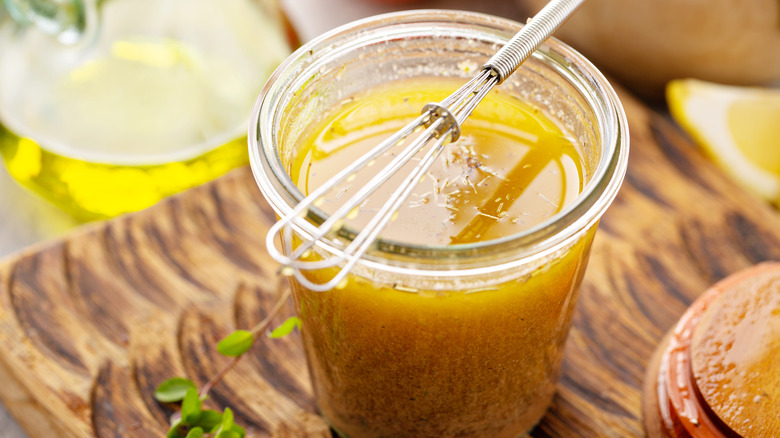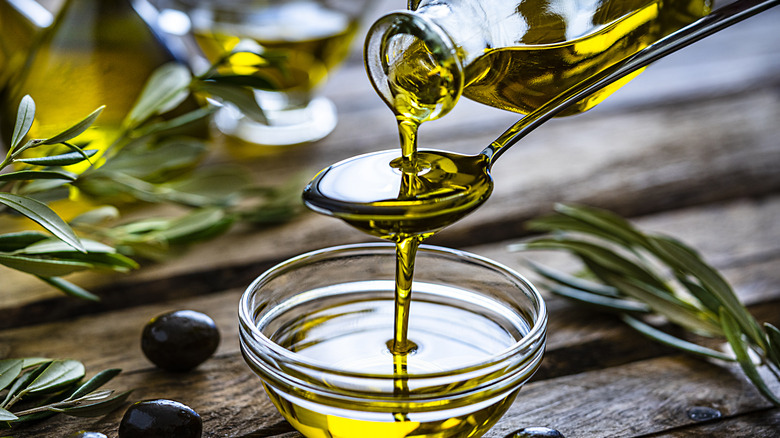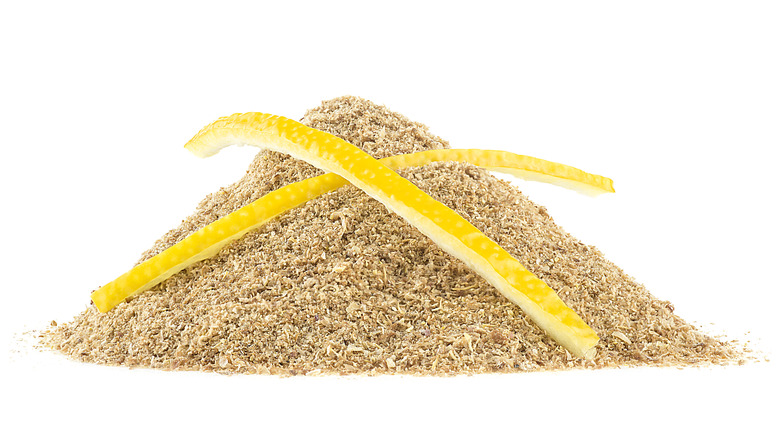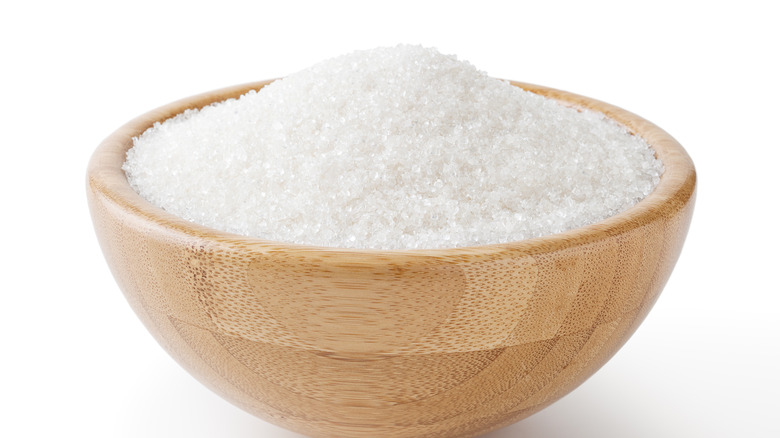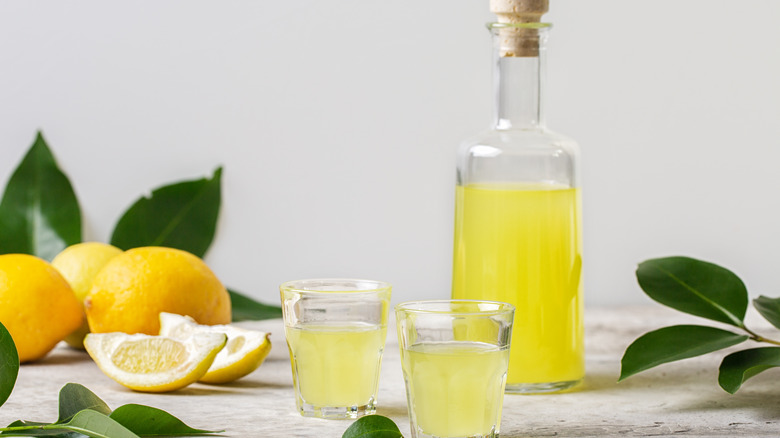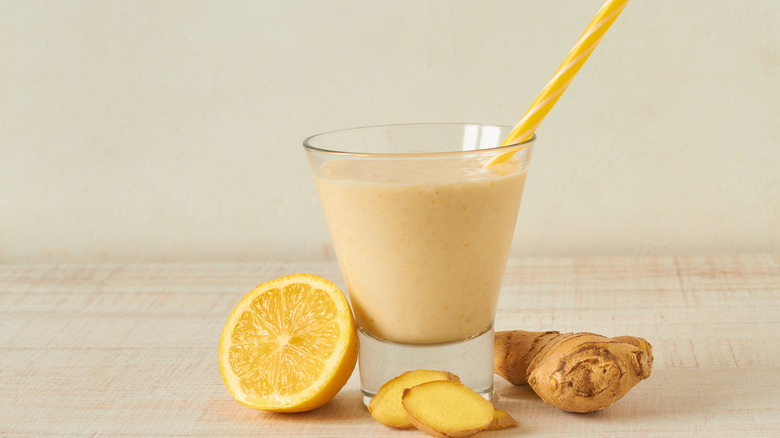10 Creative Ways To Use Dehydrated Lemons
Whether it's in the heat of the summer or the cold chill of winter, the light, bright flavor of lemon is always a welcome taste. But when you think about the flavor of lemon, it's likely derived from the fruit or juice. Often overlooked are lemon peels, which are easy to toss in the bin and move on from.
However, dehydrated lemons and their peels are incredibly versatile and can be employed in numerous culinary applications. They can be preserved using either a dehydrator or an oven, depending on the desired texture and intensity. Their concentrated flavor and adaptability make them an indispensable ingredient in any culinary enthusiast's kitchen.
As a registered dietitian and avid home cook, my enthusiasm for dehydrated lemons is deeply rooted. I frequently utilize these tangy treasures thanks to the lemon tree in my backyard that supplies a steady stream of fruit. I don't just have a passing interest, however. My expertise in using dehydrated fruits was recently enhanced when I completed a culinary nutrition course. There, I crafted various dried herb blends and seasonings, such as a lemon powder poultry rub, which demonstrated the broad culinary potential of this dehydrated produce.
Adding ground lemon peel to salad dressings, as sophisticated garnishes for cocktails, or using them for a decorative touch that enhances a drinking experience is a savvy kitchen decision. They're more than pretty: in spice rubs or baking functions, dehydrated lemons provide a delightful burst of flavor that complements both sweet and savory elements.
1. Add dehydrated lemon to salad dressings
You can make your salad dressings way more interesting with the lively flavor of dehydrated lemon peels. These peels, when ground into a fine powder, deliver a concentrated citrus punch that can transform a basic vinaigrette into a refreshing and flavorful dressing.
The process I use is simple: after dehydrating your peels, grind them into a powder and mix with quality olive oil, a touch of honey, or a splash of balsamic vinegar. You don't need much, a teaspoon or so will do. Rather than puckering, the tartness balances beautifully with the sweetness of honey and the acidity of balsamic, creating a harmonious blend that adds depth and brightness to any salad. Try experimenting with different oil and vinegar types or ratios to tailor the dressing to your taste while relying on the lemon powder to consistently provide that essential burst of citrus. Similarly, different types of lemon can impart slightly different flavors. Meyer peels may be a bit sweeter, Bearss lemon slightly more fragrant.
Citrus-infused vinaigrette tastes great with fresh greens, such as baby arugula or spinach, but it's also ideal for dressing basic green salads of heftier lettuce or more elaborate ensembles. You can incorporate this lemony dressing into pasta salads or drizzle it over grilled vegetables to add a bright, summery touch. Its versatility also extends to marinades for chicken or fish, where it can inject a vibrant, tangy flavor that complements the natural savoriness of the meats.
2. Infuse olive oil with dehydrated lemon
Another creative way to use dehydrated lemon is to infuse olive oil or vinegar to add a citrusy note. To do this, simply combine the dehydrated lemon with your chosen oil or vinegar and let the mixture sit for a few days to allow the flavors to meld. You might also combine the ingredients, lightly heat for around 10 minutes, and then allow the mixture to cool together. You should strain your infused oil to remove any grittiness.
This infusion brings a fresh characteristic to marinades for meats, fish, or vegetables. It also works wonderfully as a finishing touch, drizzled over dishes just before serving to impart a subtle yet distinctive lemon flavor. Imagine a splash of lemon-infused olive oil over a perfect caprese salad, or a hint of lemon vinegar in your favorite vinaigrette.
An infused oil or vinegar also enhances the flavor of grain dishes, adding complexity and a refreshing twist. The next time you make couscous or quinoa, toast the grains first with a tablespoon of lemon-infused olive oil, before adding water or broth.
Incorporating this element into your kitchen repertoire not only diversifies your culinary techniques but also introduces a fresh dimension to everyday meals. Whether it's a drizzle on steamed vegetables, a toss in a summer pasta, or a marinade for grilled chicken, the infusion of lemon enhances each recipe with a clean, bright flavor that is unmistakably gourmet.
3. Garnish your favorite cocktail
Using dehydrated lemon slices as a garnish adds a unique twist to cocktail presentation and flavor. For an intriguing variation, consider grilling the slices briefly to introduce a smoky flavor that enhances the drink's complexity. To achieve this, hover the dehydrated lemon slices over a low fire until they exhibit a subtle char and then place them atop your drinks. You could also use a kitchen torch to get the seared edge. Remember, you don't want to burn the peels. This technique works exceptionally well with robust cocktails such as an old fashioned, where the smoky citrus provides a perfect counterpoint to the deep flavors of whiskey.
Beyond whiskey-based drinks, dehydrated lemon peels serve as excellent garnishes for vodka beverages, such as a crisp Moscow mule or a refreshing lemonade spritzer. For a touch of elegance, try adding them to a French 75, where the dried lemon complements the bubbly prosecco and sharp gin, rounding out this classic sparkling cocktail. If your cocktail has a lot of sweetener, consider looking for a lemon variety like fino citron, also known as Primofiori. These lemons are a bit more tart and their peels can offset a heavily sugared beverage.
4. Make lemon powder
Another creative use for dehydrated lemon is to grind them into a fine powder, which can be used as a versatile spice in your cooking or baking. This powder adds a bright trait that complements both savory and sweet recipes. Sprinkle it over chicken or fish to give your proteins a zesty kick, or incorporate it into baked goods to bring a refreshing twist. A powder of dehydrated lemon or peels can also be mixed into spice blends, adding a unique citrine element that gives another level to rubs and marinades.
By making your own lemon powder, you can reduce waste and have a fresh, homemade ingredient that brings a burst of citrus to any dish. Still, when it comes to employing the concentrated flavor, a little goes a long way. Keep the amount of powder in mind as you work to blend, and don't forget to add spices that both complement and contradict the flavor. For example, mix lemon powder with sea salt, black pepper, smoked paprika, and thyme for a versatile spice blend with numerous notes. I also recommend combining your lemon peel seasoning with plenty of onion and garlic powder to add the sharp flavor alliums. For this method, a variety of lemons with a softer peel, such as Yen Ben, might be best. Dehydrating them won't toughen the peel too much, lending to a softer texture when cooked or baked.
5. Make citrus sugar
On the flip side of using dehydrated lemon peel as a savory element, you can also combine it with a sweetener. Create citrus sugar by rubbing dehydrated lemon zest into granulated sugar, resulting in a fragrant and flavorful mixture perfect for baking. Adding this to sugar is a good bet because the dehydrated peels also include pith and thus have a slightly bitter underside.
Just as you can play with lemon varieties, the type of sugar you use is also up for substitution. Demerara sugar rounds the taste out with a more complex and caramel flavor, ultra-fine baking sugar creates a more pasty texture. Regardless, the ratio should be kept small here: use significantly more sugar than peel.
This infused sugar can be used in cakes, cookies, and pastries alike. Sprinkle it over muffins before baking for a delightful crunch, or stir it into whipped cream for something akin to fruit-forward sanding sugar. Citrus sugar can also be used to rim cocktail glasses; imagine a burst of citrus with each sip of a margarita or lemonade.
Beyond desserts, citrus sugar can change your breakfast for the better. Try it on oatmeal, yogurt, or even sprinkled on toast with a bit of butter. Making your own citrus sugar also allows for customization. You can merge other citrus zests like orange or lime to create unique blends or combine it with vanilla beans as well.
6. Infuse spirits
Like oils, you can infuse spirits with dehydrated lemon peels to create homemade limoncello or add a zesty kick to your cocktails. Begin by steeping the peels in a neutral spirit for several weeks; this gradual infusion process allows the flavor to fully seep out into the alcohol, creating a richly flavored base. You should use whole peels for this method and aim to stick with varieties that are known for having more oil in the skin.
The resulting vibrant, lemon-infused spirit is delightful sipped neat, or as a dynamic component in a variety of mixed drinks. Homemade limoncello, known for its bright and refreshing taste, serves as an excellent after-dinner digestif. Moreover, a lemon-infused vodka is a perfect addition to elevate cocktails like martinis or spritzers.
This straightforward infusion technique not only deepens the flavor palette of your home bar but also highlights the multifaceted applications of dehydrated lemons in mixology. Consider starting your infusions well in advance of the holiday season to prepare unique gifts. Package the finished spirit in decorative jars or stylish bottles, complete with personalized labels or tags that reflect the craftsmanship of your homemade concoction.
7. Add dehydrated lemon peel directly to baked goods
Incorporate dehydrated lemon peels into muffins, cakes, and cookies to introduce a concentrated citrus zing. Rather than mixing them into the sugar, ground lemon peel can be added directly to the batter. A teaspoon or two won't affect the overall texture of your baked goods, but using any more than that can detract and draw out moisture. Make sure to mix and disperse evenly for a well-spread flavor. The addition goes great with blueberry muffins, lemon pound cake, and sugar cookies, where the citrus mirrors the traditional use of zest but in a different form.
Dehydrated lemon peels can also be mixed into frosting or glaze, but the easiest use is to sprinkle a bit of the lemon powder on top of your baked goods before they go into the oven to create a delicate, tangy crust. Given that your peels are already cooked, you may need to employ this sprinkle as a later addition so as not to burn the top of your dessert.
Using dehydrated lemon peels in baking not only intensifies the citrus profile but also provides a convenient way to add natural flavor without the need for fresh lemons. Once dried, dehydrated lemon peels can last for up to a year in a tightly sealed container. Keep them on hand in your pantry for baking throughout the year. Incorporating dehydrated lemons adds a nutritional boost to your desserts; they are rich in dietary fiber and vitamin C.
8. Add to smoothies
Blending dehydrated lemon peels into smoothies is an easy way to make use of this versatile ingredient. These peels not only provide some zing but also offer other benefits as well. Rich in vitamin C and loaded with antioxidants, this zippy addition doesn't just perk up your palate — it turbocharges your nutrient intake, making every gulp a step towards wellness.
To leverage this creative use of dehydrated lemon peel, roughly chop or mince them into a fine powder and blend together with your favorite smoothie ingredients. I regularly add a small amount of lemon powder to green smoothies, though it's recommended to use a sweetener as well in order to balance out the bitterness that would accompany pith mixed with garden greens. Banana is the easiest inclusion, but agave syrup also naturally compliments. The natural acidity of the lemon powder is a counterweight to the richness of creamy binders like yogurt or almond milk.
9. Lemony spice rubs
Incorporate ground dehydrated lemon peels into your spice rubs to boost the flavor of meats like chicken, pork, and fish. The lemony zest adds a bright note that complements a wide range of spices. For a Mediterranean-inspired rub, combine the lemon powder with oregano, thyme, garlic powder, and black pepper. This blend pairs wonderfully with chicken, imparting a fresh, aromatic taste that's perfect for grilling or roasting.
Another excellent combination is mixing the lemon powder with smoked paprika, cumin, coriander, and a pinch of cayenne pepper. This dry rub recipe is ideal for giving pork a smoky, slightly spicy flavor.
The natural acidity of the lemon helps tenderize the meat while the zest cuts through the richness, creating a balanced and flavorful dish. The acid in lemon tenderizes meat by breaking down the proteins in the muscle fibers. When meat is marinated with an acidic component like lemon, the acid denatures the proteins, causing them to unwind and form a mesh that can hold moisture more effectively. This process softens the meat's texture, making it more tender and juicy. The acid also helps to penetrate the meat, allowing the flavors of the marinade to infuse more deeply. This is particularly effective with tougher cuts of meat, as the acid helps to break down the connective tissue, resulting in a more tender and flavorful dish.
10. Infuse tea
Add dehydrated lemon slices or peels to your tea for a refreshing citrus flavor that elevates homemade iced tea. For hot black tea, blends like Earl Grey or English breakfast are perfect companions to the tangy lemon. Simply add a slice or some peels to your cup and steep for three to five minutes, allowing the citrus to infuse. To use the peels in green tea, try a jasmine or Sencha blend. The floral and grassy notes of these teas meld beautifully with the bright lemon, creating a balanced and invigorating drink. Steep green tea for two to three minutes with lemon peels and enjoy the subtle citrus infusion without overpowering the delicate tea.
For iced tea, blends like Darjeeling or Ceylon work exceptionally well with the tangy lemon. Add a few slices or peels to the hot tea while it brews, then let it steep for five to seven minutes before chilling. The lemon will infuse the tea with citrus notes, making a refreshing drink. For green iced tea, matcha or gunpowder green are excellent choices. Brew the tea hot with the dehydrated lemon slices or peels, steeping for three to four minutes, and then cool down with ice. For a more intense lemon flavor, leave the dehydrated lemon in the tea as it chills, or remove it after steeping for a milder taste. Dehydrated lemon not only boosts the flavor but also adds a visually appealing touch to your tea, whether hot or iced.

